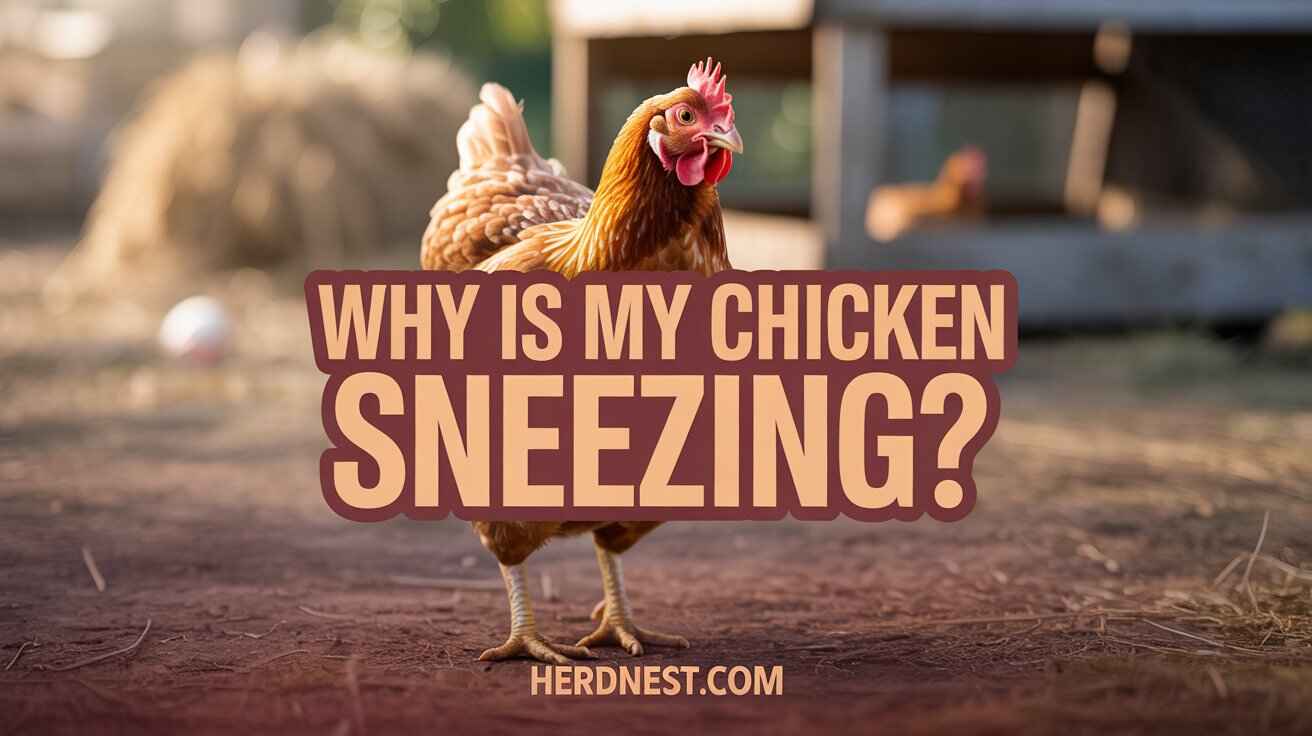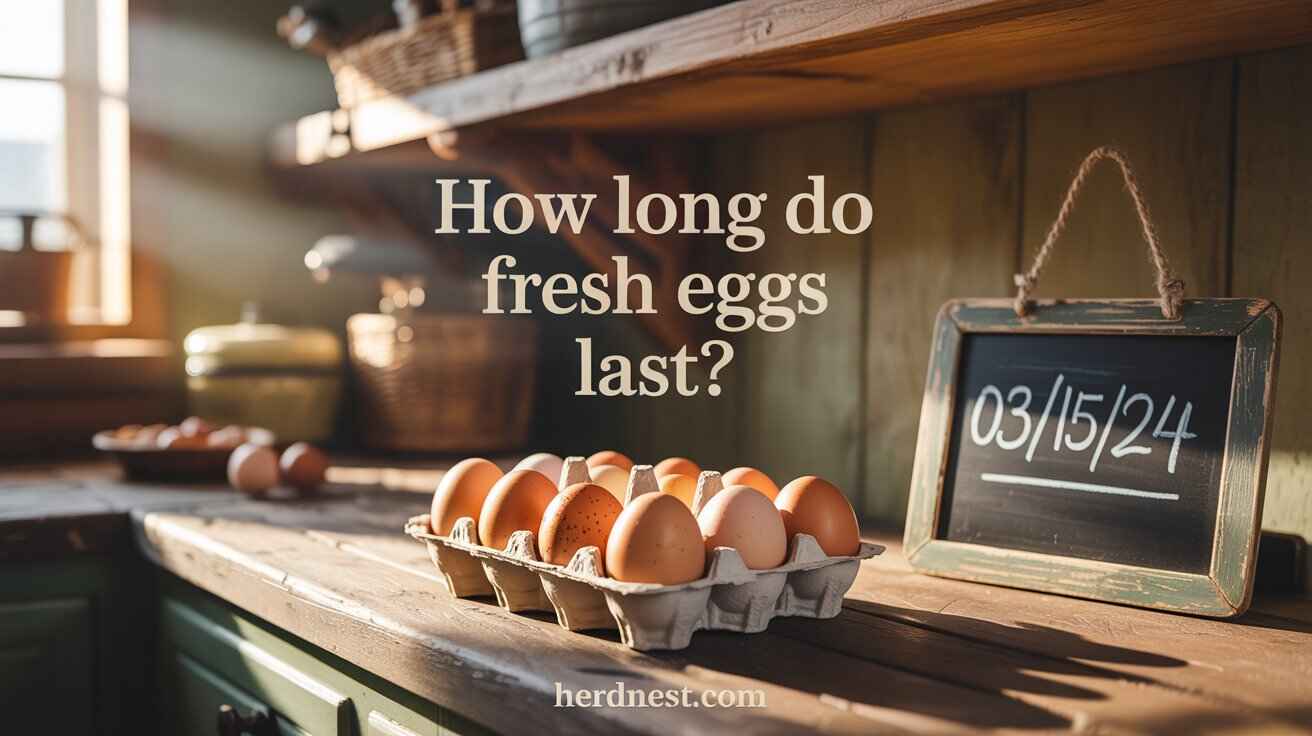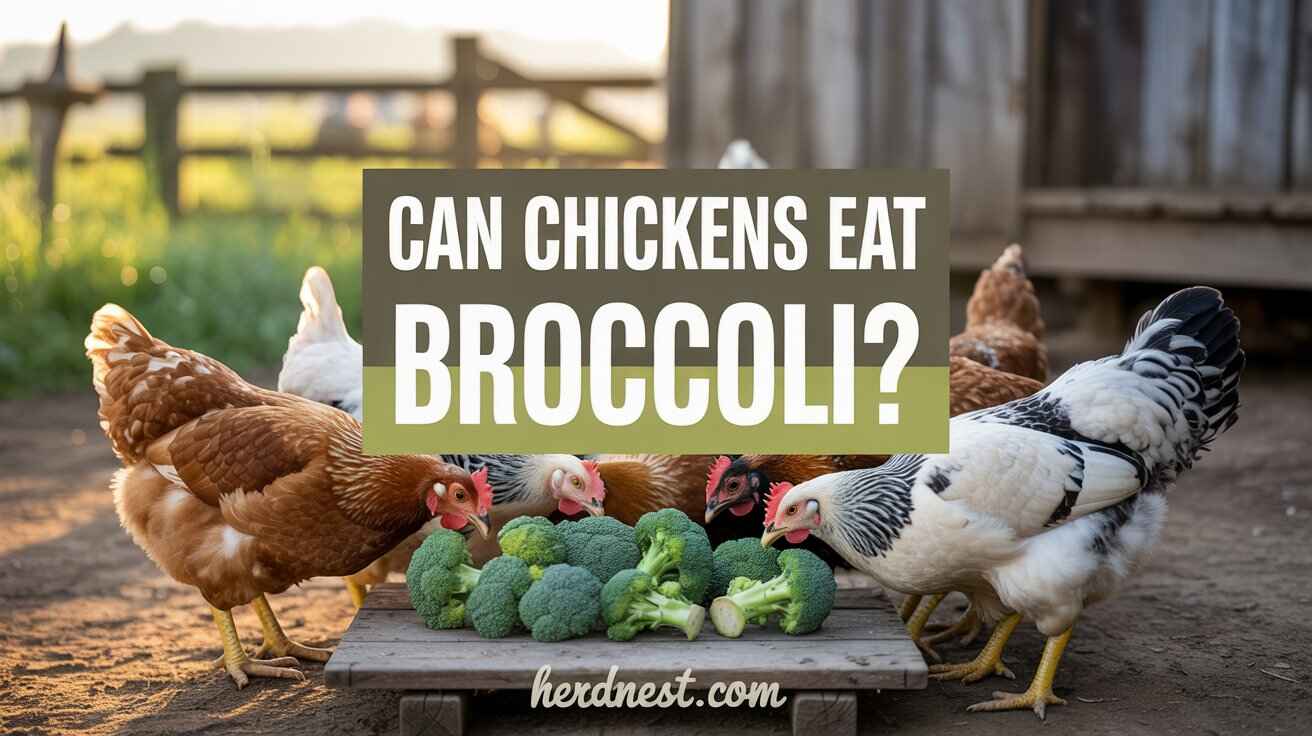Chickens can eat potatoes, but not all types are suitable for their digestive system. Some parts, like green skins, contain toxic chemicals such as solanine and chaconine, which can cause diarrhea, vomiting, and even harm their health.
To keep your flock safe, always check the peels before giving them. Remove any sprouts or exposed green flesh to avoid potential issues. Cooking the potatoes helps break down small amounts of these toxins and makes them a safer, more nutritious snack.
For a balanced diet, feed your chickens in moderation and avoid letting these root vegetables interfere with their regular meals. While raw potato peels are not recommended, cooked white potatoes can be included occasionally.
On the other hand, sweet potatoes, which are not part of the nightshade family, are completely safe and can be served raw or cooked. As omnivores, chickens enjoy a variety of foods, including grains, seeds, fruits, and meat, but always prioritize their overall safety and well-being.
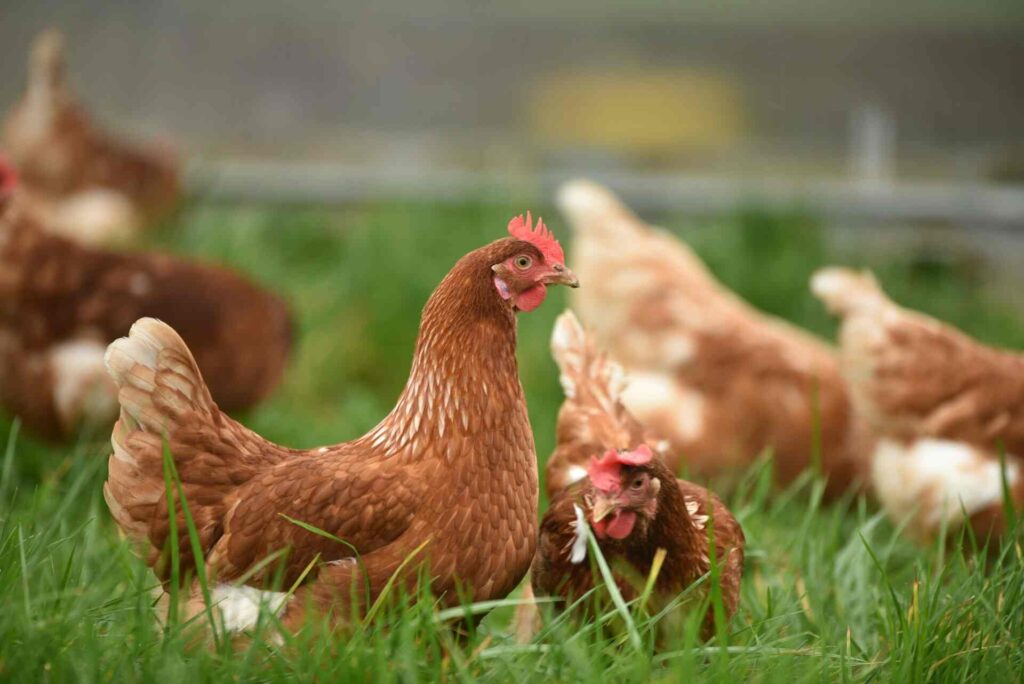
Table of Contents
ToggleCan Chickens Eat Potatoes?
Chickens can eat potatoes, but only certain types and parts are safe; cooked white potatoes without green skin are fine in moderation, while sweet potatoes are completely safe raw or cooked.
Green parts of regular potatoes contain toxins like solanine that can harm chickens, so careful preparation is crucial. Potato peels offer nutritional benefits like potassium and fiber if properly cooked, but white potatoes should never replace their balanced diet.
Sweet potatoes, rich in vitamins and safer overall, are a healthier choice. Feeding potatoes occasionally and correctly helps maintain a thriving, healthy flock without disrupting their nutrition.
Understanding Chicken Behavior and Their Diet Choices
Chickens naturally explore their environment and will eat a variety of things, including potatoes, worms, and even bugs. While they prefer some foods over others, their diet can be supplemented with cooked or properly prepared potatoes in small quantities.
In their free-range environment, chickens are known to catch and consume items like frogs, ticks, and even snakes. However, offering them raw potatoes or table scraps like peppers or tomatoes should be done cautiously and in moderation.
It’s worth noting that chickens are highly adaptable but can become cannibals if left hungry or if their social pecking order is disturbed. They may also consume things that are harmful, such as long dead animals, which they are drawn to despite the presence of harmful bacteria.
Offering table scraps from the kitchen, such as eggs, meat, or trimmings, can be a useful way to supplement their meals while reducing household garbage. Ensuring a balance in their diet will keep your flock healthy and thriving.
Parts of Potatoes Chickens Can Eat
Chickens can eat several parts of potatoes, but not all are edible. While flesh, leaves, and skins of sweet potatoes are safe for them to devour, caution is needed with other types like russets and whites.
If these potatoes are exposed to sunlight, they may turn green, making them unsafe for consumption. To protect their health, avoid feeding such parts to your chickens, as they could cause complications. Always ensure that what you offer is safe and prepared appropriately.
Potato peels can be given as occasional treats, but they should never replace the main diet. A few times a week is enough to keep things balanced. Overfeeding can lead to digestive issues, so always feed in moderation and monitor how much they consume.
By including safe parts of potatoes, you can provide a nutritious addition to your flock’s diet without risking their well-being.
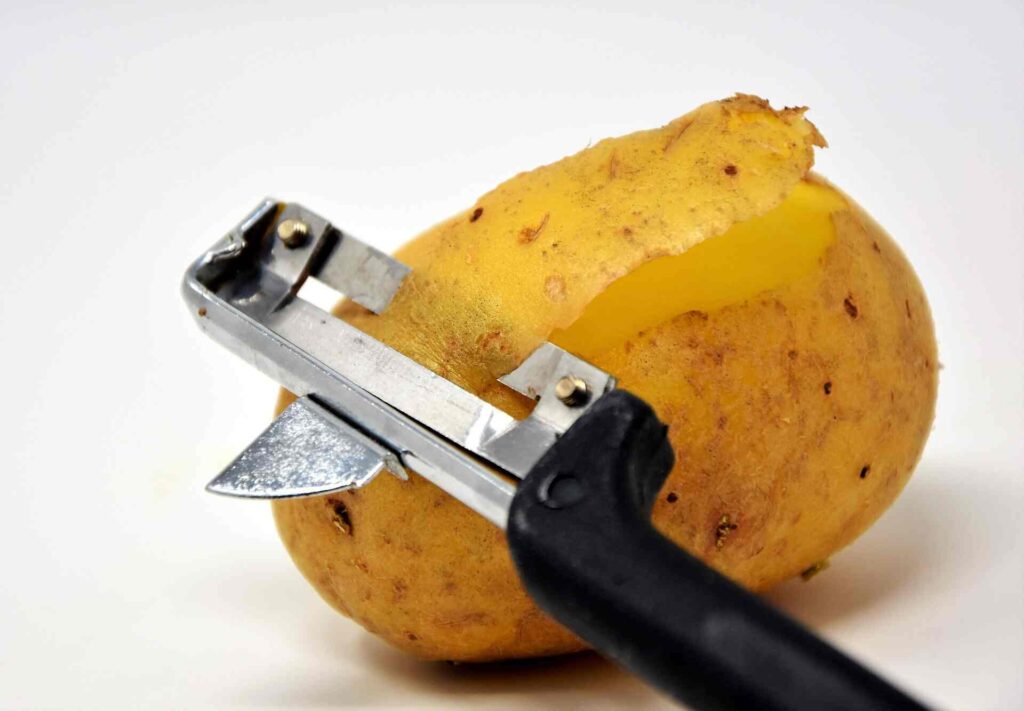
Are Potato Peels Good for Chickens?
Potato peels can provide many benefits for your chickens when included in their diet in the right way. Packed with essential nutrients like potassium, iron, copper, and calcium, they support strong bones, healthy egg production, and overall health.
The fiber in peels helps with digestion, prevents constipation, and promotes a healthy gut. Plus, the presence of antioxidants and flavonoids boosts immunity and protects against certain diseases. Including peels can also help maintain their weight while reducing risks like obesity and diabetes.
Feeding potato peels also lowers cholesterol levels, improving blood circulation and reducing the risk of heart failure. The presence of omega-3 fatty acids and vitamins like niacin and vitamin B3 aid in metabolism and the breakdown of food.
With proper preparation, peels are a digestible and affordable option to keep your flock healthy on a budget. Just be cautious with their feeding to avoid harmful chemical reactions, which could lead to problems like high blood sugar or even a potential heart attack.
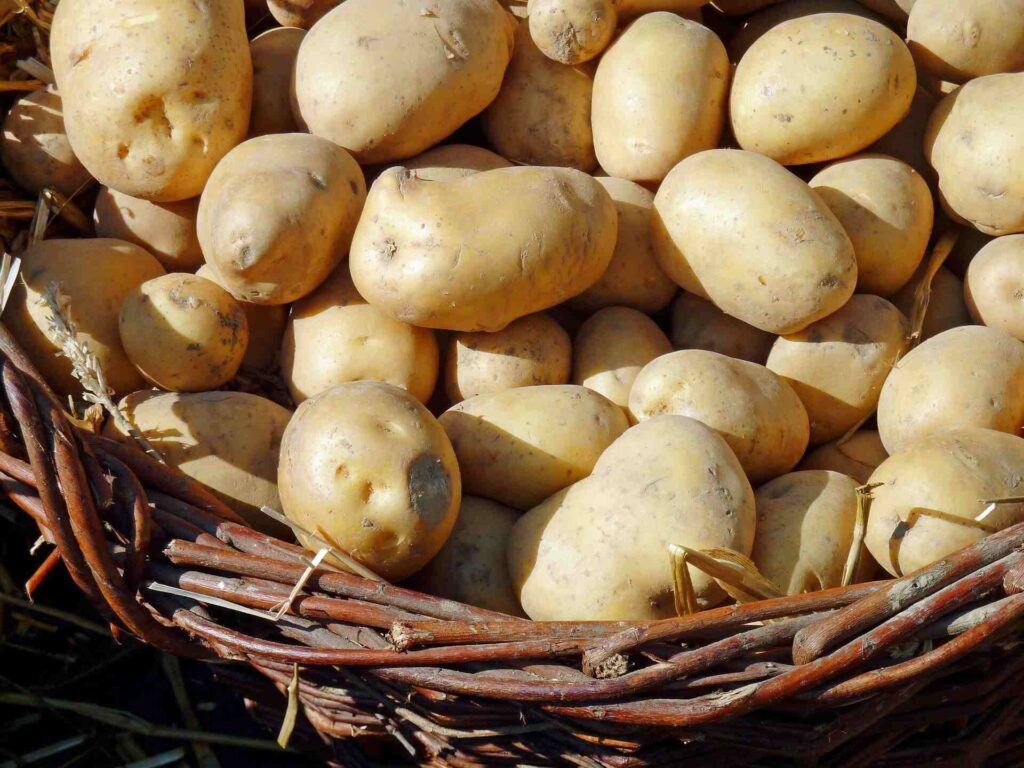
Feeding White Potatoes to Chickens Safely
White potatoes may not kill your chickens, but they can pose hidden risks. While most foods won’t harm them instantly, toxins in green skins or undercooked potatoes can accumulate in their bodies over time, causing unseen damage.
Each individual chicken reacts differently, so it’s better to take caution when feeding them. To minimize risks, always serve peeled, fully ripened, and thoroughly baked or cooked potatoes. Avoid anything with green skins or unripe parts altogether.
My personal recommendation is to skip white potatoes entirely if possible. However, if you have a leftover crop or feel the need to include them, ensure they’re prepared properly and given sparingly. By being cautious, you reduce the chance of potential harm to your flock and keep them healthy and thriving.
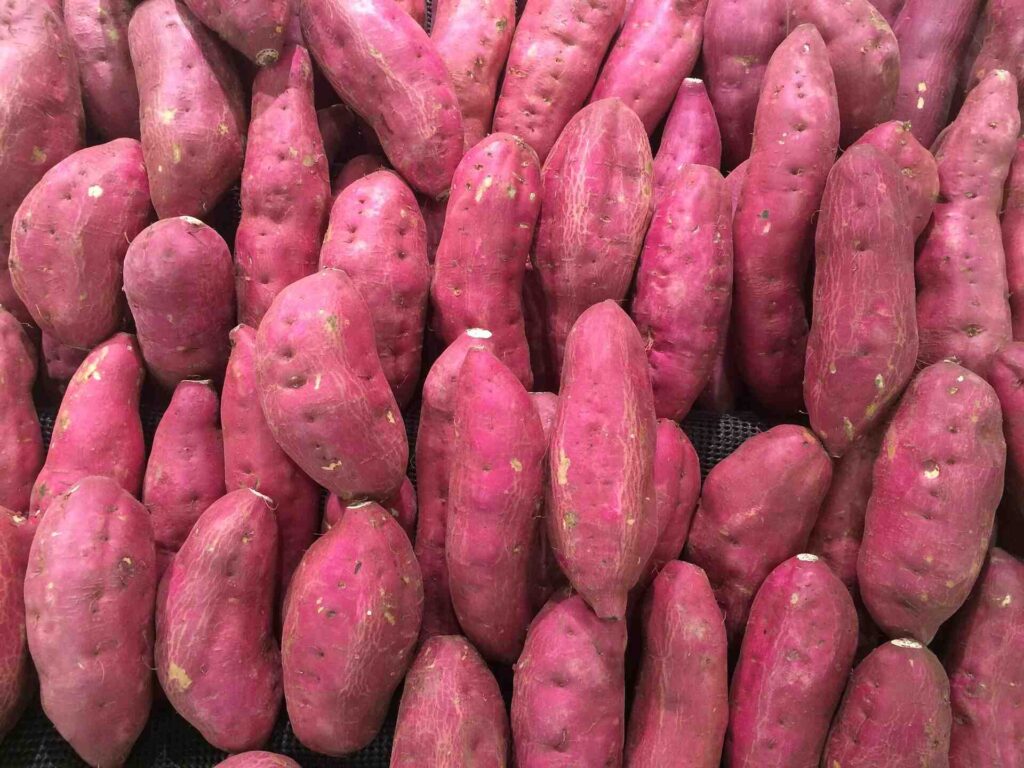
Sweet Potatoes: A Healthier Option for Chickens
Sweet potatoes are a safer and more nutritious option for your chickens compared to white potatoes, which can be potentially harmful. Being part of the morning glory family, every part of the plant—from leaves, vines, flowers, stems, flesh, to peelings—is perfectly safe to feed, whether cooked or raw.
They are rich in essential nutrients like beta carotene, fiber, potassium, calcium, iron, magnesium, and thiamin, as well as vitamins such as vitamin C and vitamin B. These components not only keep your flock healthy but also enhance their overall diet.
With fewer carbs and calories than white potatoes, sweet potatoes are considered a super food, not just for chickens but for humans too.
As someone who raises chickens in Maine, I switched to eating sweet potatoes myself and now use all the scraps, leftovers, and peelings as feed for my flock. My recommendation is to add every part of this nutritious plant to your chickens’ meals to boost their health naturally and safely.
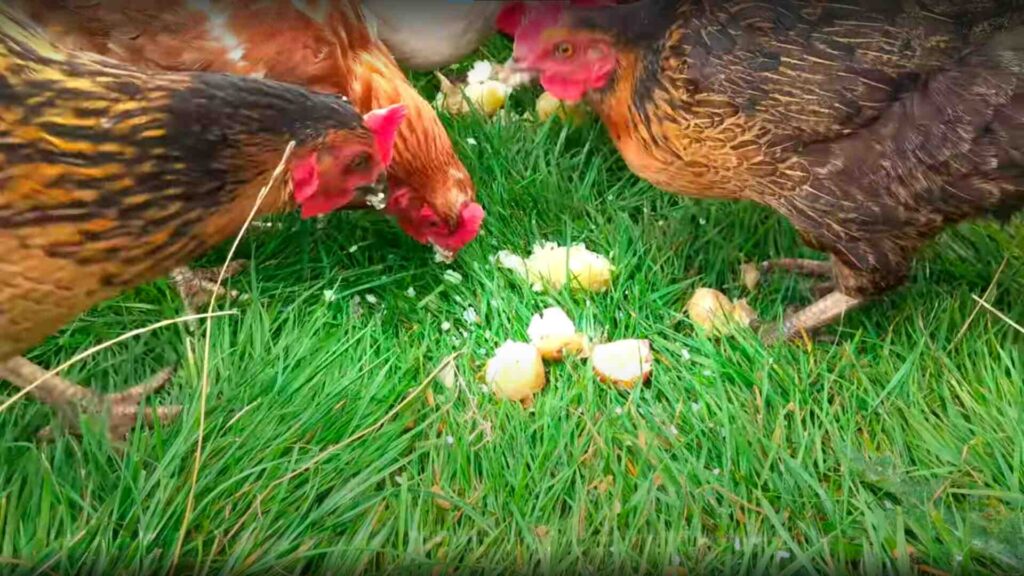
Safely Feeding Potatoes to Chickens
When it comes to feeding chickens potatoes, being careful is absolutely imperative. Not all varieties are safe for your flock, especially the white and yellow parts, which might contain toxins like solanine.
This chemical can cause problems like stomach upset, inflammation, or even organ damage. To ensure their safety, always check the peels—they should be fresh and not green. Feeding raw peels can be harmful, so it’s better to bake them at a high temperature to make them palatable.
Feeding potatoes as an occasional treat is fine, but follow the rule of thumb keep portions small, and don’t let them replace the balanced diet your chickens need.
A mix of protein-rich food and vegetables works best, with treats making up no more than 10% of their total diet. For energy efficiency, I often roast potato peels alongside family meals in the kitchen. It’s a practical way to use up leftovers while keeping the scraps for the compost counter.
By following these steps, you’ll ensure your chickens enjoy a healthy, toxin-free meal without compromising their well-being. Always remember to be selective with what you feed them, avoiding anything that could cause frequent issues like bitter or starchy items. This approach keeps your flock happy, safe, and productive.
Insights on Feeding Potatoes to Chickens
Studies on feeding potatoes and sweet potatoes to chickens have shown promising results, especially in the industrial agriculture sector, where reducing costs and improving performance is key.
Research suggests that potato meal can act as a substitute for corn meal in the diets of broilers and laying hens without causing any negative effects. Another study found that potato protein offers an antimicrobial benefit, reducing harmful coliforms like E. coli in the intestines, which helps prevent fecal contamination.
Similarly, feeding sweet potato root meal at levels of 27% to 30% during the starting and finishing phases improved carcass quality in broilers.
While potatoes and their starchy nature can serve as occasional treats, balancing them with higher-protein and nutrient-dense foods like meat, eggs, or even dairy is essential. Overfeeding treats high in carbohydrates, such as oatmeal, grapes, and bananas, could disrupt their diet.
Poor nutrition may lead to molting, fewer eggs, or even issues like soft-shelled and brittle eggs. To avoid these problems, stick to a balanced feed and incorporate moderation when offering scraps.
For chickens on pasture, the additional feed may not even be necessary as they already benefit from natural foraging, and adding fermenting chicken feed can further boost their overall health.
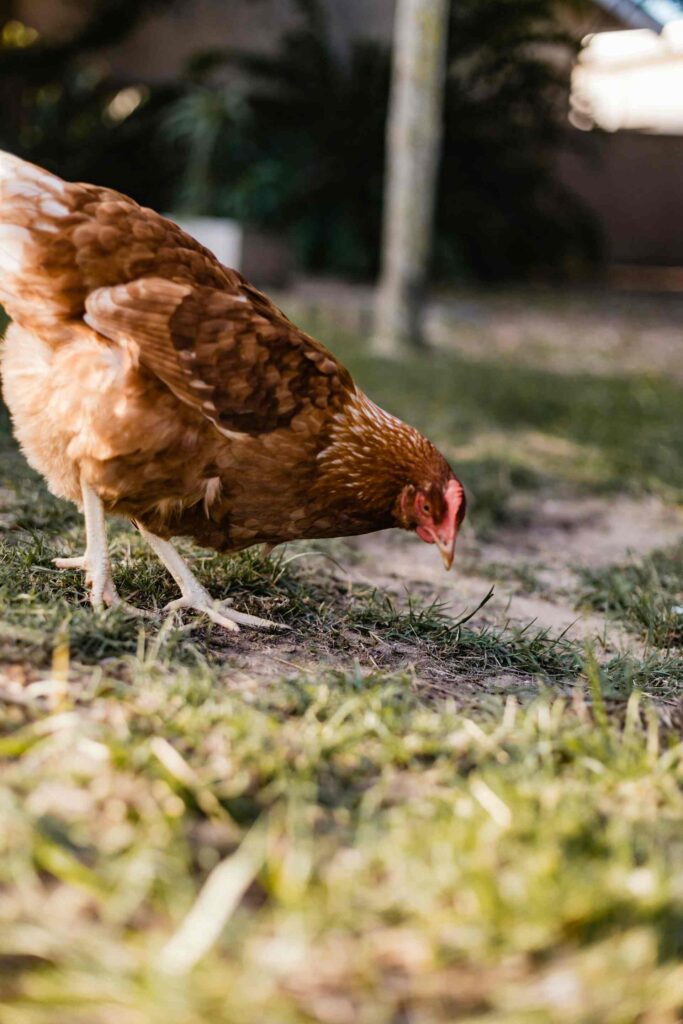
Final Thoughts on Feeding Potatoes to Chickens
Potatoes can be a part of your chickens’ diet if handled properly. Cooked potatoes, free from green parts and solanine, are safe to offer your flock as an occasional treat.
While sweet potatoes are a safer option, being rich in nutritional benefits, both types should be given in moderation to avoid disrupting their main meals. Adding baked potato peels or table scraps can supplement their diet but shouldn’t replace essential nutrients they need to grow and thrive.
For those considering switching to sweet potatoes or yams, they are not only more nutritious but also better for your chickens’ health. Their raw or cooked parts, including peels, can be safely consumed by your flock.
Sharing your experiences with feeding potatoes can help others find the right balance for their chickens. Always ensure good condition of the food and remember, healthy feeding habits lead to a thriving flock.

